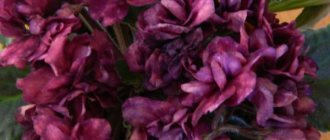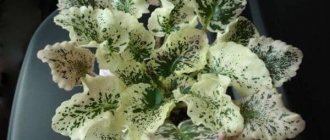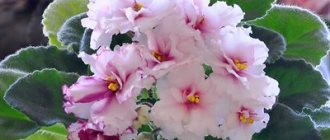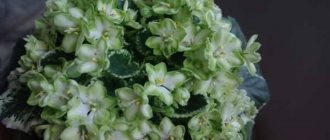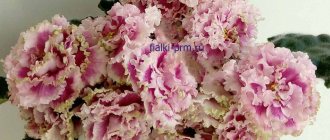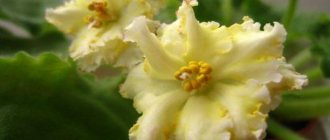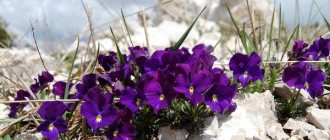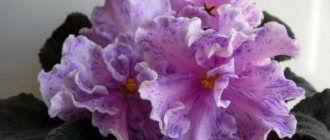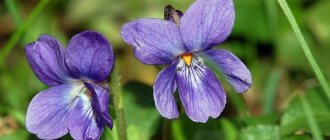Violets (lat. Saintpaulia) are one of the most popular indoor flowers. For their bright, abundant and long-lasting flowering in the depths of winter, violets tolerate any whims of the plant from the mountainous regions of East Africa. Descriptions, photos of some of the best varieties of violets, reviews of popular varieties are presented in our rating. Prices are approximate - for a young plant in a pot.
Usambara violet (Saintpaulia) got its name from the name of its discoverer, the German baron Walter von Saint-Paul, who in 1892 sent its seeds to Germany from Africa. Saintpaulia belongs to the Gesnerieceae family. It has a basal rosette of leathery leaves with thick hairs. Five-petalled flowers are collected in racemes. Violet propagates by leaf cuttings and rosettes when dividing the mother bush.
The number of Saintpaulia varieties exceeds thousands. At the same time, the originality of shapes and colors is striking. During vegetative propagation, violet is prone to the formation of sports (sections that are phenologically different from the mother plant), which accelerates the selection of the species. It is very difficult to talk about the popularity of specific varieties of violets, since it greatly depends on “fashion” and individual preferences. Violet growers often admit that two years ago they collected exclusively blue-violet shades, and now they “hunt” for fantasy. Therefore, our rating presents only a few of the many best (according to flower growers) varieties of violets of domestic and foreign selection.
Violets with fantasy on petals
Violets with fancy colored petals.
The group of fantasy violets got their name from the first representative, which appeared in 1949 and was called Fantasy. It was a variety with a blue fantasy over a lavender field of petals. Fantasy varieties are those varieties of violets whose petals are decorated with dots, strokes and splashes, strokes, a venous pattern, with an eye, a border of dots, spots or peas of a different color in relation to the main field.
The amount of fantasy and color intensity increases in the 2nd and 3rd flowering. In the first one, strokes and dots may be few in number or even completely absent, especially if we are talking about a red fantasy on a pink field. There is also a connection between the quality of flowering of fantasy violets and the temperature of their maintenance. In cool conditions, such Saintpaulias more often and more correctly repeat the varietal color.
The main property of fancy is genetic instability and do not always transmit color when propagated by leaves. When such a hybrid is propagated by leaf cuttings, some of the children will not inherit the characteristic color. If the violet flower has a fancy color, then the occurrence of sports increases to 70%. Therefore, it is better to purchase such varieties as cuttings from a flowering rosette according to the variety and grow all the children until flowering, choosing the most beautiful and bright ones. The probability of flowering by variety increases sharply if we are talking about propagation by stepsons.
Be aware that when purchasing a cutting or baby of a fancy violet variety, you risk getting a sport. Sport is a spontaneously occurring, stable genetic disorder. These are random, abrupt changes in the appearance of plants, which, having occurred once, are passed on to offspring. This means that the sport will never be able to become a variety again - neither with the passage of time, nor if an attempt is made to propagate such a plant in any way.
Since natural types of Uzambara violets had a characteristic violet-blue color, the flowers of modern hybrids, when used for sports, most often tend to darken. Sometimes fantasy varieties produce sports of amazing beauty, worthy of their own name. Sport is a new variety, and a stable one, and sometimes it is so good that it is impossible to give preference to sport or Saintpaulia with the original fantasy pattern.
If you want to purchase a fantasy variety baby, pay attention to the color of the violet leaves; the lighter they are, the greater the likelihood of getting the correct flowering. If the foliage appears to have dark stains, then the likelihood of obtaining exactly the same variety decreases. The same applies to completely dark leaves.
Sometimes it happens that some fancy or bordered variety of Saintpaulia, not a chimera, suddenly blooms with flowers of a chimeric color. Some Saintpaulia varieties are especially prone to forming chimeric sports. It is advisable to propagate Saintpaulia varieties that are especially difficult to reproduce by stepson or peduncle, like chimeras.
Fantasy Saintpaulias can be divided into the following groups according to the main background of the flower:
Light (white, pink, coral, red) - the main background and dark fantasy (lavender, blue, violet, purple). The sport turns out to be monochromatic in shades of dark color or a paradoxical Saintpaulia is obtained: the dark fantasy disappears from the pink tone or the sputtering disappears, although the dark color dominates the light one;
Dark (blue, violet, purple) - the main background and light, the so-called reverse, fantasy (white, pink, coral, red). The sport turns out monochromatic in shades of dark color;
Light pink, coral with fuchsia, raspberry, strawberry, grape dusting - the main background. Sport is obtained in the form of one spray;
There are 2 types of fantasy: direct and reverse. The first type is the most common. This is when streaks and spots of a dark color, usually blue or purple, are scattered across a light field, most often pink. For varieties with reverse fantasy, the opposite is true: the field is darker than the fantasy itself. There are much fewer of them. A fantasy pattern can be located randomly across the entire field of the petal, or it can form a beautiful border along its edges. In any case, such violets are very impressive.
There are also Saintpaulias with two or even three fantasy (for example, dark pink and blue fantasy on a light pink background). Oddly enough, such Saintpaulias are less likely to go into sports; sometimes one or two fantasy games just disappear. Let me remind you that this occurs when the gene responsible for one or another hereditary trait is lost.
Increased acidity of the soil PH 6.0 or less or, conversely, the alkaline environment of the substrate at PH 7.0 or more can transform Saintpaulia from ordinary (standard) flowering to sport. In this case, not only the color of the flower changes (in the fantasy violet, instead of a fantasy pattern, only a dark background is obtained or the fantasy color is present only in the form of a coating), but other characteristics also change, in particular, the color and shape of the leaf varies.
I would also like to draw attention to such a feature of fantasy varieties as the intensity of coloring. If during the first flowering the number of specks on the petal is insignificant, then already in the 3-4th flowering their intensity and number increases.
The most beautiful fantasy violets
Moderator: Floriana
The most beautiful fantasy violets
Post by Svyatoslav » 12 Jan 2010, 04:22
The most beautiful fantasy violets
In this topic, everyone will be able to show a photo of their favorite fantasy Saintpaulia variety and tell why we love it.
Read also: Good varieties of columnar apple trees
Fantasy Saintpaulias - all about them
Post by galinka31 » Mar 02, 2010, 07:05
I love this variety of mine, Playful Rainbow. At first, I didn’t like it at all and wasn’t impressed, but they simply convinced me to buy it and now I don’t regret it at all, because, it seems to me, this variety turns out to be the most delicate in comparison with the options that I’ve seen from others. The color of its flowers is so soft pink, and the fantasies are lilac-blue. Sheer charm.
Re: Fantasy Saintpaulias - all about them
Post by galinka31 » Mar 02, 2010, 07:09
I don’t know for sure whether this variety can be classified as a fantasy variety. This is the Chanson variety and it has absolutely charming poisonous-raspberry splashes on its petals. A sight for sore eyes.
Re: Fantasy Saintpaulias - all about them
Post by Chernik » April 23, 2010, 07:56 pm
Re: Fantasy Saintpaulias - all about them
Post by Taem » 12 Oct 2011, 01:10
I have three fantasy varieties - Proshka (Frolov), Optimara Little Hopi II and Shanson. I really like all three. Here is my Optimara Little Hopi II
Re: The most beautiful fantasy violets (saintpaulias)
Post by Chernik » December 18, 2011, 21:48
Re: The most beautiful fantasy violets (saintpaulias)
Post by Svyatoslav » Dec 18, 2011, 10:13 pm
Re: The most beautiful fantasy violets (saintpaulias)
Post by svet-lana1 » Dec 24, 2011, 4:47 pm
I really love fancy violets; today I like the shape of the flower and the rivulets that spill over the surface of YAN-Malinka’s favorites.
EK Northern Lights is a very beautiful violet:
I liked EK-Star Valley:
And there are many, many more things to like, all the fantasy violets are beautiful
Re: The most beautiful fantasy violets (saintpaulias)
Post by Alesha » Dec 24, 2011, 04:55 pm
I really love Lyon's Magic Charms for their airy flowers and their huge hat.
And also Rainbow`s Quiet Riot is an undeniable masterpiece!
Re: The most beautiful fantasy violets (saintpaulias)
Post by Victoria Ch » 24 Dec 2011, 17:28
This mysterious, fragile, but bright beauty of fantasy.
I have joy. Finally, my wait and long-suffering have been rewarded.
fantasy PC-Harlequin bloomed correctly
The rosette, of course, turned out to be loose. Well, what to do, winter. There are violets on my window.
I forgive everything to such a bright young lady. In the middle of a cloudy winter I decided to please her with such a colorful outfit:
No matter how we treat fantasy varieties for their whims and inconstancy, all grievances disappear when they bloom so brightly.
Here are some more of my fantasies:
. AE-Snow Edelweiss:
It bloomed right away according to the variety, without any tricks. All 3 kids turned out to be correct.
Delicate bouquet, delicate. The outlet is neat.
And this is a 4-petal mutant:
Rob's Hopscotch semi-mini:
After two gorgeous sports options, it bloomed correctly.
. Rowdy Ray semi-mini:
Rosette variegated. Glossy dark green foliage with a pink frame goes well with the equally delicate fantasy roses.
At first there were also pink, burgundy, and white sports options.
Rob's Dust Storm semi-mini:
There was actually a fight with sports:
I won. no, not friendship, but sport, but such a pretty, purple, bright brunette. It makes me happy too.
It’s good that there were duplicates of the variety.
These are the kind of funny and dramatic events that happen in fantasy; in general, you won’t get bored.
Friends, if you are a little bored, get yourself fancy varieties of violets.
Surprises and surprises, pleasant or maybe not so pleasant, are guaranteed to you.
The main thing is to approach everything philosophically and with a sense of humor. And all will be well. I know it.
Sveta, you have some beauties
Sveta, your beauties are fantastic, of course they’re scary, but there’s intrigue when you’re waiting for a class or a sport! And yet, I thought there would be no more wishes, but still I wrote down Snowy Edelweiss in my treasured notebook, I once wanted it for a long time, but now I decided that it was necessary!
Lily, thank you. Yes, to
Lily, thank you. Yes, I have no complaints about Edelweiss, it’s a wonderful variety and blooms often.
Svetlana, I was very impressed by yours
Svetlana, I was very impressed with your PC-Harlequin - it’s on my wish list, and several sports ones and this high-quality one were all from the same sheet?
Natasha, thank you. Yes, Harlequin
Natasha, thank you. Yes, Harlequin I had the only cutting that produced 4 children. The first 2 are sports, the 3rd, to my great joy, is by grade. And that's what I noticed. The leaves on the rosette have slightly different color intensities. It seems to me that if you take a darker leaf, the varietal probability may increase. I will conduct an experiment in the future.
You turned out beautiful
Your PC-Harlequin turned out beautiful, Svetlana! And somehow I said goodbye to him. I didn’t like the rosette, it was kind of shaggy, the stems were long. Maybe you have a different line. Rowdy Ray is interesting, I simply charmed you with its delicate flowers in combination with a variegated rosette, I wouldn’t refuse such a miniature little thing. Thanks for showing.
Olga, thank you. Yes, there is an outlet
Olga, thank you. Yes, the socket at Arlekino turned out to be handy. I assume the reason is the lack of light in winter. We'll see by spring, maybe he'll pick up his little hands.
Svetlana!
Svetlana!
Svetochka, they are very good
Svetochka, your fantasies are very good! I especially liked Harlequin, you made it bright and expressive. My children are growing too, I want to see what happens as soon as possible. I really hope so. that at least some variety will bloom. It’s very interesting that you showed off your sportswear. They also surprise and delight. Of those three, the blue sporty one is good! And the two-color violet surprised me, with half of it blue flowers. Well, what can you do if fantasy people inherit the variety so unstable? Just for fun, you can admire these. You showed us everything wonderfully in this topic. Thank you!
Tanyusha, thank you. Yes,
Tanyusha, thank you. Yes, fantasy varieties are always unpredictable. Sometimes sports are no worse, or even better, than varieties.
Excellent variety, bright.
Excellent variety, bright.
Natalya, thank you. Grade
Natalya, thank you. The assessment of professionals inspires further achievements.
Svetlana, fantasy beauty
Svetlana, the beauty of fantasy is truly mesmerizing! Well done, thanks for showing! But I also liked the blue Storm sport.
Lydia, thank you. Lovely
Lydia, thank you. The beauty of fantasy is its unpredictability, I like these surprises.
Svetlana, you just
Svetlana, you have simply fantasy beauty and a good selection of your varieties, “a fight with sports,” is a breathtaking spectacle.
Julia, thank you. Yes fantasy
Julia, thank you. Yes, fantasy always surprises and delights.
Reminder for a newbie!
Uzambara (Uzumbar) violet is a plant of the Gesneriaceae family, growing in the natural environment of tropical and subtropical regions of Asia, Africa, Eastern Australia, South America and the Indian Ocean islands.
Saintpaulia is a plant named after the Saint-Paul father and son, who brought a plant unknown to Europeans from the Uzambara district (modern Tanzania) in the 19th century, presented for the first time at the international flower exhibition in Ghent in 1893.
Indoor violet has been one of the most popular plants in indoor floriculture since 1927. By 1949, more than 100 varieties had been bred, and today their number exceeds several thousand.
Rooting
- possibly in water, in substrate, moss.
Priming
- purchased soil or a mixture of leaf, coniferous, turf and peat soil in a ratio of 3:1:2:1 with the addition of raising agents (perlite, vermiculite, river sand, crushed sphagnum moss.
Lighting - it is best to place flower pots on western or eastern windows. To ensure that the plant is evenly illuminated from all sides, the pots are periodically rotated. In winter, when daylight hours decrease, you can use artificial lighting - fluorescent lamps.
Caring is a real art and serious painstaking work at the same time, including watering, fertilizing, and creating a favorable humid climate. Water Saintpaulias as the soil dries. The soil must be moistened regularly, but excess moisture should not stagnate in the roots. When watering, you must ensure that water does not get on the leaves. You cannot water the Uzambara violet with cold water. Fertilizing is done with complex mineral fertilizer once every two weeks. Saintpaulia reacts negatively to a lack of nitrogen in the soil. Optimal air humidity is approximately 50%, temperature is 20-22 ° C, without sudden fluctuations and drafts. The leaves of the plant should not touch the window glass. Removal of faded flowers and damaged leaves is carried out regularly.
Reproduction - planting a leaf cutting, part of a leaf, or a daughter rosette. The most popular method is rooting leaf cuttings. The formation of roots and the development of children lasts 4-8 weeks.
Pests are one of the gardener's problems. There are many different types of pests and it is very difficult to classify them. Among Saintpaulia pests, several groups can be distinguished: mites (spider mites, flat mites, transparent mites, etc.), insects (aphids, thrips, springtails, poduras, scale insects, whiteflies, scale insects, etc.), worms (nematodes).
Diseases - distinguish between infectious (gray rot, powdery mildew) and non-infectious diseases (rotting of the stem and root, wilting of the lower leaves, yellowing, leaf spotting, incomplete opening and premature drying, falling of flowers) of plants. The causative agents of infectious diseases are bacteria, fungi, and viruses. To prevent infectious diseases, you should strictly observe the regimes of watering, temperature, humidity, and lighting. Non-communicable diseases usually arise due to poor agricultural practices. They may appear in one instance and not spread to others.
Fantasy violet varieties
Violet was previously considered one of the favorite plants of gardeners. In the modern world, the passion for breeding and growing new varieties of this beautiful, delicate flower has truly reached its climax. Experienced flower growers and breeders are developing more and more new varieties of Saintpaulia, causing admiration and delight for yet another miracle. The most popular varieties at present are fantasy varieties. The variety of colors, the play of colors combined with intricate strokes, dots and other patterns, truly excites the imagination and amazes.
Many, even experienced gardeners, however, encounter some difficulties when purchasing these varieties. To begin with, it is worth noting that violets of the fantasy variety, ladies are extremely capricious and whimsical. For the favorable growth and development of fantasy, the correct composition of the soil, its acidity, humidity and air temperature play a huge role. Having decided to acquire a Saintpaulia fantasy plant, it would be a good idea to consult with a professional in this field or read the relevant literature. Many breeders give detailed descriptions and advice on growing, agricultural technology and other features of violets in their articles, for example in the almanac “The World of Violets”.
There are now a great many varieties with fantasy colors, and new ones are developed periodically. Fantasy varieties are common among almost all groups of Saintpaulias: miniature, semi-miniature, standard, trailer. Popular ones are:
- RS-Sea Princess,
- Snow Edelweiss,
- Jan-Tornado,
- New Year's Snow,
- wedding,
- B-Man s Comiso,
- Fantasy Makers and others.
- Violet fantasy and sports
By purchasing new varieties for your collection of violets, including fantasy ones, in the form of children, you can purchase a sport. Spontaneously occurring genetic abnormalities are called sports. Of the majority of children grown from one cutting, only a small proportion will inherit the entire gene pool of a given variety, and only some of them will have a fancy color. The rest are usually sports.
If you want to minimize the risk of acquiring sports, grow fantasy violets using leaf cuttings. It is better to purchase leaf cuttings from a flowering plant, with the most abundant dots, specks, and streaks. Also, an equally sure way is to reproduce the fantasy with a stepson.
As a rule, the main background of a fantasy-colored flower is light, and the fantasy design is of darker tones. But there are also so-called reverse fantasy, in which everything is the other way around.
Home care
Specimens of the varietal variety of violets in indoor gatherings demonstrate a very problem-free nature :
- that are most beneficial for violets are those that are located on the southeast side - here the plants are most illuminated.
The window sills on the south side of the house are better illuminated in winter, but in summer severe overheating is noticeable there, which threatens the plants with burns. Therefore, it is recommended to slightly shade the windows during midday heat. Windows in the eastern and western directions are classified as semi-shaded; here the sun's rays are available to violets only in the first half of the day. Northern windows are the worst suited for placing violets , and then only if they are equipped with additional lighting; - watering the variety should not be carried out too often while simultaneously monitoring the drying of the top layer of the substrate in the flowerpot;
- additional nutrition with mineral fertilizers at a particular moment in time or not, showing their internal state with a decorative appearance.
In the same way, you can find out the plant’s need for certain types of fertilizers. But this procedure of agrotechnical care cannot be abused; - An important role in all life processes of specimens of the variety is played by the optimal lighting regime with a well-chosen structure. For proper growth and healthy flowering, it is necessary to combine long-term illumination of the plant with a natural spectrum with exposure to LED lighting;
- the possible temperature gradient is +20 + 24°C. It is important to prevent its extraordinary jumps and cold drafts;
- timely provision of violets in the home collection with fresh substrate is a necessary condition for maintaining the health of the specimen - this will ensure aeration and water permeability of the soil. In addition, a good drainage system is needed;
- For replanting, it is more correct to use “transshipment”, although it is suitable when working only with healthy violets.
Violet fantasy: content features
You should also pay attention to factors that influence color, such as temperature and age of the plant. Most often, during the first flowering, the color is less saturated, and the number of different strokes is insignificant. You should not think that the plant is defective, you need to wait for the second or third flowering, most often by this time everything changes for the better. It has also been noted that in winter, at lower temperatures, fantasy is formed more than during the summer heat, when fantasy is either too weakly developed or completely absent. At the same time, you should not despair either; with the onset of normal temperatures, the violet completely restores its varietal color.
If you have purchased a sport, do not rush to get rid of it; there are cases when sports, as they mature, acquire a peculiar coloring that is not inferior in beauty to the original, and can even become a separate type of fantasy, receiving an independent name.
Another problem that gardeners face is the variability of the color of the flowers of these plants. It would seem that they took a leaf from one type of fantasy, for example, with a pink color with blue speckles, did everything correctly, took into account all the smallest details, and when the violet bloomed, it turned out to have all blue flowers. And there are many such examples. In this case, it is worth considering that fantasy varieties are very unstable genetically and may not convey 100% of the color of the mother plant.
In any case, growing and breeding fantasy violets is a truly fascinating and creative process, which, with experience, can also become a good type of business.
Features of flowering, growth and reproduction
Attention! It grows and develops well at home, and also reacts extremely positively to wick watering.
It grows quite quickly and blooms also quickly . The flowering is special every time; as the bush grows and ages, it blooms differently.
The peduncles are thick and short, clearly stretching upward towards the center, so the flowering is always capped.
The color can vary greatly from flowering to flowering , depending on the temperature and light conditions, as well as on the placement of the rosette and its health.
On old well-developed rosettes, the flower size reaches 6 cm.
It reproduces well by all means , but varietal characteristics are best transmitted through leaves and stepsons. But the peduncle method rarely gives the expected result, since flowering almost never repeats completely, only partially.
What is Violet Chimera?
Chimeras include varietal violets that have stripes in the center of each flower petal. Sometimes flowers have blotches or streaks along the edges. There are various types of varieties in which inclusions may be darker or lighter than the color of the flower itself.
There are variegated chimeras that look even more impressive thanks to their bright leaves, which only emphasize the beauty of the inflorescences.
Chimera violets can produce baby sports, which can be completely special and surpass the parent plant in beauty and originality.
It should be borne in mind that if you want to get an exact copy of a chimera plant, you need to take the peduncle of the parent plant for propagation, in this case the risk of getting a sport plant will be lower than when propagating by leaf. You can find out about propagation by peduncles here - Reproduction of Violet-Saintpaulia by leaf, leaf fragment, stepsons and peduncles.
But if you only got a chimera violet leaf for propagation, we recommend waiting for the babies to bloom in order to determine which plant has more maternal characteristics.
Violet Kostina Fantasy (K. Morev)
Indoor violet Kostina Fantasy belongs to the genus of hybrid Saintpaulias from the Gesneriev family . The variety was bred by breeder Konstantin Morev and it can be assumed that he named it in his honor.
The variety has a rosette of standard shape and size . The leaves are oval, with a clear vein pattern. The color of the leaves depends on temperature and light, and varies from green to dark green.
The flowers are medium sized, about 4.5 cm, semi-double and simple. The color is fancy, the main color is pink, there are dark lilac strokes and sometimes dots on it.
The color of the bloom changes every time, from bloom to bloom. Along the edge of the petal there is a slight waviness and a white border, which disappears in the heat, and there is also a white eye in the center.
Varietal characteristics are well conveyed, but there are two types of sports. The first ones are completely pink, the second ones are blue. Pink flowers in a young rosette may be a sign of excessive coolness in the room, so this option should be checked in two or three blooms.
What is Violet-sport?
Sport violets are violet babies that appear as a result of a genetic mutation and do not inherit the maternal color. This manifests itself in changes in leaves and flowering (color, shape). Sports are most often obtained by breeding violets with complex colors (two or three colors, chimeras, etc.).
Usually sports turn out to be more attractive and brighter than the mother plant, but with all this, it is generally accepted among breeders that sports are a marriage. Such violets cannot be bred, they are not bred into a separate variety and are not registered in a special register of Saintpaulia varieties.
What is Violet Fantasy?
Fantasy violets are plants with lush, bright flowering. Everyone who loves violets strives to get a collection of as many of these varieties as possible. You can get acquainted with different varieties of fantasy violets here - Types and varieties of Saintpaulia-Violets. As a rule, the leaves of such a plant are large and have a dark color, which creates a wonderful contrast with the bright shades of the inflorescences themselves, emphasizing their beauty and, as it were, drawing attention to them.
Every violet grower strives to get as many children as possible from such a bright plant, but most often such specimens produce sports that are no worse than the mother plant and never disappoint their owners. But if you want to get an exact copy of the mother violet from a fantasy violet, do not be disappointed immediately at the first try, but keep trying, it happens that from one cutting you get both sports and varietal children mixed together, and sometimes you can get all sports ones.

